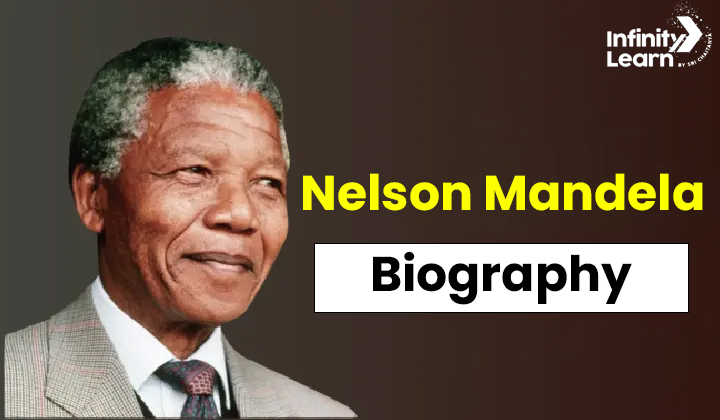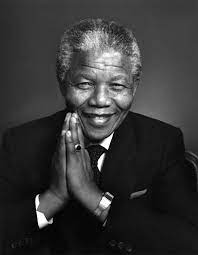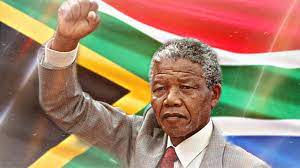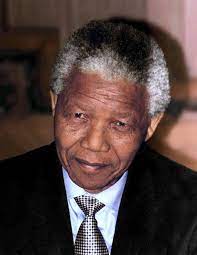Table of Contents
Nelson Rolihlahla Mandela was born on July 18, 1918, in Mvezo, near Qunu, in what was then known as Transkei. From a young age, he was destined for greatness. Growing up in a humble family, Mandela was influenced by traditional customs and had dreams of becoming a chief.
He attended Healdtown Methodist Boarding School and later went to Fort Hare University College, where he met Oliver Tambo. During his time at university, Mandela became active in student politics. His involvement in these activities led to his expulsion in 1940 after he participated in a student protest. This early experience marked the beginning of his lifelong commitment to fighting for justice and equality.

Nelson Mandela Biography
| Aspect | Details |
|---|---|
| Full Name | Nelson Rolihlahla Mandela |
| Date of Birth | July 18, 1918 |
| Date of Death | December 5, 2013 |
| Cause of Death | Prolonged respiratory infection |
| Age | 95 years |
| Spouses |
|
| Birth Date and Place | July 18, 1918, Mvezo, near Qunu, Transkei |
| Early Education | Healdtown Methodist Boarding School |
| Higher Education | Fort Hare University College, BA degree by correspondence |
| Initial Career | Mine policeman, legal articles |
Who is Nelson Mandela?
Nelson Mandela was born into the Thembu Dynasty, a ruling family in the Transkeian Territories of South Africa. He grew up in a small village called Qunu. His great-grandfather, Ngubengcuka, was the leader of the Thembu people until the British took control. Mandela got his last name from his grandfather.
His father, Gadla Henry Mphakanyiswa, was once the chief of Mvezo village but lost his position because he did not get along with the British rulers. After that, the family moved to Qunu. Even though his father lost his job, he remained an important figure in Thembu matters. He helped Jongintaba Dalindyebo become the new leader of the Thembu, who later took care of Mandela after his father passed away.
Mandela’s father had four wives and a large family with 13 children. Mandela spent most of his childhood in the home of Nosekeni Fanny, his father’s third wife. His first name, Rolihlahla, playfully means “troublemaker.”
Nelson Mandela Biography – Education
Rolihlahla Mandela was the first in his family to go to school when he was seven years old. A teacher named him ‘Nelson’ after a British admiral. His father died when he was nine, and a man named Jongintaba took care of him. Mandela went to a school close to where Jongintaba lived. At sixteen, he followed his tribe’s customs and went to a boarding school where he learned about Western culture. He finished his Junior Certificate in just two years instead of three.
Later, Mandela went to Healdtown, a college where many Thembu royal family members studied. He got into boxing and running when he was nineteen. He started studying for a B.A. degree and met his lifelong friend Oliver Tambo at university. Mandela got involved in protests against university policies and had to leave.
After leaving university, Mandela tried to work as a guard at a mine but was fired when they found out who he was. With the help of his friend Walter Sisulu, he found a job as a clerk at a law firm. He finished his degree through correspondence and then went to the University of Witwatersrand. During this time, he lived in a place called Alexandra.
Nelson Mandela Biography – Marriage & Family
Nelson Mandela had three marriages and a total of six children. He also had many grandchildren and great-grandchildren.
His first wife was Evelyn Ntoko Mase. Together, they had two sons named Madiba Thembekile and Makgatho, and two daughters named Makaziwe.
Winnie Madikizela-Mandela, his second wife, was from the same area as him. They had two daughters together, Zenani and Zindziswa. However, due to differences in their political views, they separated and later divorced.
On his 80th birthday in 1998, Mandela married Graça Machel, who was previously married to Samora Machel, a leader from Mozambique. The wedding was conducted by a king, following extensive discussions to agree on the bride price. Interestingly, the grandfather of the king who officiated the wedding was the same person who had chosen a bride for Mandela when he was young, leading him to leave his hometown.
Inspiring Quotes by Nelson Mandela
Nelson Mandela’s life and legacy are celebrated through his powerful words. Here are some of his most inspiring quotes on love, caring for others, conquering fear, and facing challenges for the greater good.
- “Real leaders must be ready to sacrifice all for the freedom of their people.”
- “A fundamental concern for others in our individual and community lives would go a long way in making the world the better place we so passionately dreamt of.”
- “Resentment is like drinking poison and then hoping it will kill your enemies.”
- “I learned that courage was not the absence of fear, but the triumph over it. The brave man is not he who does not feel afraid, but he who conquers that fear.”
- “Education is the most powerful weapon which you can use to change the world.”
- “Everyone can rise above their circumstances and achieve success if they are dedicated to and passionate about what they do.”
- “I like friends who have independent minds because they tend to make you see problems from all angles.”
- “It always seems impossible until it’s done.”
- “Many people in this country have paid the price before me and many will pay the price after me.”
- “Do not judge me by my successes, judge me by how many times I fell down and got back up again.”
- “Money won’t create success, the freedom to make it will.”
- “It is in the character of growth that we should learn from both pleasant and unpleasant experiences.”
- “It is not our diversity which divides us; it is not our ethnicity, or religion or culture that divides us. Since we have achieved our freedom, there can only be one division amongst us: between those who cherish democracy and those who do not.”
- “For to be free is not merely to cast off one’s chains, but to live in a way that respects and enhances the freedom of others.”
- “A critical, independent and investigative press is the lifeblood of any democracy. The press must be free from state interference. It must have the economic strength to stand up to the blandishments of government officials. It must have sufficient independence from vested interests to be bold and inquiring without fear or favour. It must enjoy the protection of the constitution, so that it can protect our rights as citizens.”
Nelson Mandela Images
Nelson Mandela’s images capture the essence of a remarkable leader whose legacy continues to inspire generations. From iconic portraits to candid moments, Nelson Mandela’s images depict his resilience, wisdom, and unwavering commitment to justice and equality. These pictures serve as visual reminders of his enduring impact on the world and his tireless pursuit of freedom and reconciliation. Whether in black and white or vibrant color, Nelson Mandela’s pics are windows into his extraordinary life, offering glimpses of hope, determination, and the triumph of the human spirit.



Nelson Mandela Question Answer
In class 10, students often encounter questions and answers about Nelson Mandela, the iconic leader of South Africa’s anti-apartheid movement. These questions delve into his life, struggles, and contributions to the world. Understanding Nelson Mandela’s journey can inspire students and deepen their appreciation for themes like resilience, equality, and justice.
A typical set of Nelson Mandela class 10 questions and answers might include inquiries about his early life, his activism against apartheid, his time in prison, and his presidency. Students may also be asked to summarize key events or speeches associated with Mandela’s life, such as his famous “I Have a Dream” speech or his inauguration as South Africa’s first black president.
Engaging with Nelson Mandela’s story through questions and answers not only enhances students’ historical knowledge but also encourages reflection on the values of perseverance, compassion, and unity that Mandela embodied. By exploring his legacy, class 10 students can gain valuable insights into the power of leadership and the importance of standing up for what is right, even in the face of adversity.
Ques 1. What does Mandela thank the international leaders for?
Answer. Mandela felt very lucky to have important guests and leaders at the swearing-in. Not long ago, South Africans were seen as criminals. He thanked them all for coming from far away to see the first Black President of South Africa take the oath. It was a great sign that other countries recognized South Africa as a free nation. This event showed that justice, peace, and human dignity won together.
Ques 2. What ideals does he set out for the future of South Africa?
Answer. Mandela aimed to free South Africans from poverty, suffering, and discrimination. He wanted everyone in the country to have the freedom to live without being held back by any form of prejudice or hardship.
Ques 3. What does courage mean to Mandela?
Answer. Mandela believed that being brave doesn’t mean you’re never scared. Instead, it means facing your fears and overcoming them. He said courage isn’t about not feeling afraid, but about beating that fear.
Ques 4. What “twin obligations” does Mandela mention?
Answer. Mandela talks about two important things everyone must do in life – (i) take care of your family, including your parents, spouse, and kids; and (ii) help your community, country, and the people around you.
Nelson Mandela Biography – Political Activity
Mandela’s political journey began with the founding of the African National Congress Youth League in 1944, serving as National Secretary in 1948 and National President in 1950. In 1952, as President of the ANC in the Transvaal, he became one of four Deputy Presidents of the organization. His activism led to his arrest under the Suppression of Communism Act and a nine-month imprisonment sentence, suspended for two years.
In 1956, Mandela was among 156 political activists arrested and charged with high treason, leading to a trial that lasted until 1961. In the same year, he became Commander-in-Chief of Umkhonto we Sizwe, the armed wing of the ANC.
| Key Roles | Details |
|---|---|
| ANC Youth League | National Secretary (1948), National President (1950) |
| Defiance Campaign | Arrested under Suppression of Communism Act (1952) |
| Treason Trial | Charged with high treason (1956-1961) |
| Umkhonto we Sizwe | Commander-in-Chief (1961) |
Imprisonment and Later Life
Mandela was involved in numerous protest actions, including anti-pass law campaigns. He was arrested in 1962 and sentenced to five years for incitement to strike and illegally leaving the country. In 1963, he was tried again in the Rivonia Trial for sabotage and conspiracy to overthrow the government, receiving a life sentence in 1964.
While imprisoned on Robben Island, Mandela continued to lead and educate fellow prisoners. Diagnosed with tuberculosis in 1988, he was transferred to Victor Verster Prison, where he initiated talks with the government, leading to his release on February 11, 1990.
| Imprisonment Details | Events |
|---|---|
| First Arrest | 1962, sentenced for incitement to strike |
| Rivonia Trial | 1963-1964, sentenced to life imprisonment |
| Health and Release | Diagnosed with tuberculosis (1988), released (1990) |
Presidency and Legacy
Upon his release, Mandela resumed his leadership role in the ANC and led negotiations with the South African government, culminating in the interim constitution in 1993. He led the ANC to victory in the 1994 elections and was elected President of South Africa. Mandela donated a portion of his salary to the Nelson Mandela Children’s Fund and retired from public life in 2004. He passed away on December 5, 2013.
Mandela’s legacy includes his contributions to ending apartheid and his efforts in promoting peace and reconciliation. He was awarded numerous honors, including the Nobel Peace Prize, which he shared with Frederick W. de Klerk.
| Presidency and Legacy | Details |
|---|---|
| Presidency | Elected President (1994), retired (1999) |
| Nobel Peace Prize | Awarded with Frederick W. de Klerk |
| Death | December 5, 2013 |
Nelson Mandela Death
In February 2011, Mandela got sick and had to go to the hospital because of a breathing problem. This made news all around the world. Later in December 2012, he had to go to the hospital again to remove a lung infection and gallstones.
In March 2013, Mandela had a surgery to help him breathe better, but then he got sick again and had to go back to the hospital in Pretoria. In June 2013, his breathing got even worse, and he was in very bad condition when he went back to the hospital.
The Archbishop of Cape Town, Thabo Makgoba, visited Mandela in the hospital and prayed with his wife, Machel. The President of South Africa, Zuma, canceled a trip to visit Mandela the next day.
In September 2013, Mandela left the hospital, but he was still not feeling well. After being sick for a long time, Mandela died on December 5, 2013, at his home in Houghton, surrounded by his family. President Zuma announced his death on TV. The country mourned his death for ten days. They held a big ceremony in Johannesburg’s FNB Stadium on December 10, 2013, and December 8 was a national day of prayer and thinking about Mandela.
Mandela’s body was at the Union Buildings in Pretoria from December 11 to December 13, and then they had a big funeral on December 15 in Qunu. Many people from other countries came to South Africa for the funeral.
It was later found out that a lot of money meant for helping people was used for Mandela’s funeral. Many people shared their memories of Mandela on social media. When Mandela died, he left his money and property, about $4.1 million, to his wife, family, workers, and schools.
Conclusion on Nelson Mandela
In conclusion, Nelson Mandela was a remarkable leader whose life story continues to inspire people around the world. As we explore who is Nelson Mandela, we learn about his journey from a young activist to the first black President of South Africa. His biography of Nelson Mandela highlights his commitment to justice, equality, and reconciliation.
For those seeking a more concise overview, the biography of Nelson Mandela in 150 words or a short biography of Nelson Mandela in 200 words captures the essence of his achievements and challenges. The Nelson Mandela short biography serves as a powerful reminder of the impact one individual can have on society. Mandela’s legacy of courage, forgiveness, and dedication to human rights will forever be remembered, making him an enduring symbol of hope and resilience for future generations. His life teaches us the importance of standing up for what is right, no matter the obstacles we face.
Nelson Mandela Biography FAQs
Who is Nelson Mandela?
Nelson Mandela was a South African anti-apartheid revolutionary, political leader, and philanthropist who served as President of South Africa from 1994 to 1999. He was the country's first black head of state and the first elected in a fully representative democratic election.
Who according to Nelson Mandela is a Courageous Man?
According to Nelson Mandela, a courageous man is someone who stands up for what they believe in, even in the face of adversity and fear. He admired those who fought against injustice and oppression, regardless of the risks involved.
How Does Nelson Mandela define the meaning of Courage?
Nelson Mandela defined courage as the ability to overcome fear and act with determination and resilience in pursuit of justice and freedom. He believed that courage was not the absence of fear, but rather the triumph over it.
When did Nelson Mandela Die?
Nelson Mandela died on December 5, 2013, at the age of 95, at his home in Houghton, South Africa.
Who was Nelson Mandela Class 9?
Nelson Mandela is often studied in Class 9 as part of history or social studies curriculum, especially in courses that cover topics such as apartheid, civil rights movements, and the struggle for equality.








